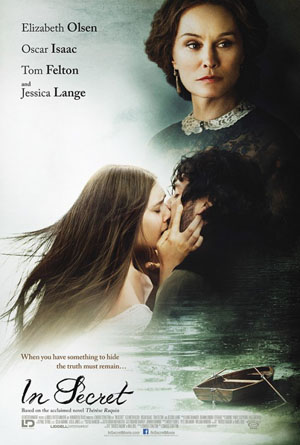 IN SECRET
IN SECRET(R)
*** (out of 5)
February 21, 2014
STARRING
Elizabeth Olsen as THÉRÈSE RAQUIN
Oscar Isaac as LAURENT
Tom Felton as CAMILLE
Jessica Lange as MADAME RAQUIN
Shirley Henderson as SUZANNE
Matt Lucas as OLIVIER
Mackenzie Crook as GRIVET
Studio: Roadside Attractions
Directed by: Charlie Stratton
BY KEVIN CARR
Listen to Kevin’s radio review…
On first blanche, “In Secret” is not my cup of tea. I am not normally drawn to costume dramas or stories of different levels of French society in the nineteenth century. So when I started watching “In Secret,” I gave it the benefit of the doubt.
The movie did not transfix me, but I wasn’t completely turned off by it. The story is rather slow-moving, which is to be expected considering this is an adaptation of a play, which is in turn an adaptation of a book written as a contemporary story back in the 1860s.
Elizabeth Olsen plays Thérèse Raquin, a girl who was dumped into the lap of her aunt when she was a girl after her mother died. Raised in a depressing and oppressive household by Madame Raquin (Jessica Lange), Thérèse becomes the caregiver for his ailing cousin Camille (Tom Felton). When she reaches adulthood, Thérèse learns her father has died, and Madame Raquin basically swindles her inheritance from her by forcing her to marry Camille, furthering the oppression.
The dysfunctional family moves to Paris, where Thérèse starts an affair with Camille’s workmate Laurent (Oscar Isaac). They want their freedom to be lovers, which leads to them taking drastic measures to ensure that Camille and Madame Raquin are out of the picture.
The set-up of “In Secret” is pretty dry. In an effort to depict the drab and gray world of nineteenth century lower society in France, the film is dimly lit and uses a washed out color palate, almost to the detriment of the film itself. Things get darker as they get to Paris, reflecting Thérèse’s grim life.
It’s a slow start, but when people really start doing nasty things to each other, I got interested again. There’s a lot happening beneath the context of the film, which is achieved at the hand of the performances by both Olsen and Isaac. Likewise, Lange delivers a fine performance with more subtlety than she has in her “American Horror Story” roles that put her back on the map as a notable actress.
Tom Felton lays things on a bit thick as the greasy and creepy cousin-husband. I’m not sure if this is a result of the role or that Felton is incapable of playing against the type he is known for in the “Harry Potter” series. Ultimately, while there are some great subtle performances by others in the film, the movie itself is not very subtle when they present characters like Camille.
I wasn’t quite sure of the moral point in this film, which added a certain degree of interest, actually. The film starts out with Madame Raquin and Camille as the oppressors (though the former is more deliberate and forceful while the latter is a lazy victim of his own circumstance). You do feel sorry for Thérèse, so when it’s time for her comeuppance, you expect more satisfaction.
However, the tables are flipped rather abruptly, and we’re asked as an audience to feel more sympathy than is probably deserved by these characters.
Similarly, there’s a questionable punishment dished out to Thérèse for her hyper-sexual nature as seen in the film. This might be a remnant of the time in which the original story was published, but it seems counterintuitive to a more civilized and enlightened modern society. After all, there’s a lot of pain in Thérèse’s life, and her own libido ends up being her own downfall.
Still, with these moral ambiguities, the movie is not a waste. It’s slow moving and can even be characterized as boring in parts, but it did keep my interest enough to finish it. Were it my typical cup of tea, I might have liked it even more.
Podcast: Play in new window | Download
